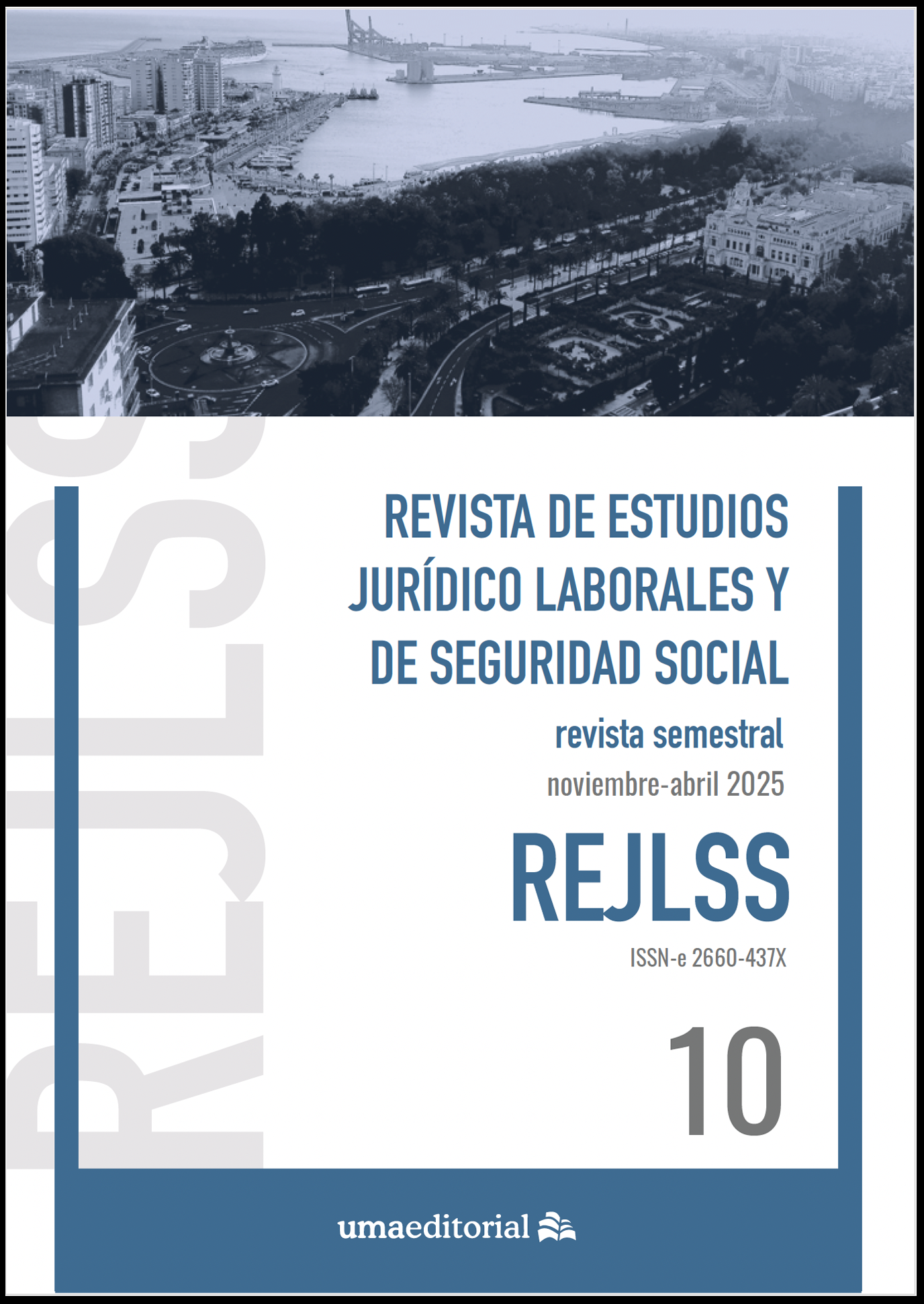Teleworking in the context of the digital and demographic transition
DOI:
https://doi.org/10.24310/rejlss10202521280Keywords:
Teleworking, distance working, new technologies, mature workers, demographic changes, active ageingAbstract
In recent decades we have experienced a progressive and accelerated transformation of the economic and business framework, with the consequences that this has from an employment point of view. Therefore, among these changes, the impact that digitalisation has had on the shaping and development of labour relations cannot be overlooked. Today, the expansion of artificial intelligence, platform work or teleworking highlights the challenges involved in trying to apply regulations designed according to a Fordist production model to one such as the one described above. In addition, there are the challenges presented by the demographic transition and, as part of this, the clear ageing of the population. This study will critically analyse the current impact of new forms of service provision, such as teleworking, in the context of this debate and to determine how far it can be promoted in our country as a possible way of delaying the age of pensionable retirement.
Downloads
Metrics
Publication Facts
Reviewer profiles N/A
Author statements
Indexed in
-
—
- Academic society
- N/A
- Publisher
- Universidad de Málaga. UMA Editorial
References
Álvarez de la Rosa, M., “El trabajo a domicilio” en AA.VV. (De la Villa Gil, L.E. Coord.), El trabajo, España, Editorial Universitaria Ramón Areces, 2011.
Cuadrado Salinas, P., Fernández Cerezo, A., Manuel Montero, J. y Delgado Rodríguez, F.J., “El impacto del envejecimiento poblacional sobre la evolución de la tasa de actividad en España”, en Boletín económico. Banco de España, 2023.
López Vico, S., “Teletrabajo y Discapacidad” en Revista de derecho de la seguridad social. Laborum, núm. Extra 5, 2023.
Maldonado Molina, J.A., “La protección de las personas mayores en la Sociedad 5.0”, Revista de derecho de la seguridad social, núm. extra 6, 2024.
Maldonado Molina, J.A., “El envejecimiento activo como paradigma y sus efectos en la decisión de jubilarse. El caso español”, Quaestio Iuris, Vol. 15, núm. 3, 2022.
Monereo Pérez, J.L. y López Vico, S., El teletrabajo tras la pandemia del COVID-19: una reflexión sobre su ordenación y normalización jurídica, Murcia, Laborum, 2022.
Monereo Pérez, J.L. y Rodríguez Iniesta, G., La pensión de jubilación, Murcia, Laborum, 2ª Edición, 2022.
Monereo Pérez, J.L., La reforma del sistema de pensiones en España. Sostenibilidad económico-financiera, suficiencia y adecuación social, Barcelona, Atelier, 2022.
Montes Adalid, G.M., “Una breve aproximación al teletrabajo como opción para posponer la jubilación: Especial referencia a la sostenibilidad del sistema de pensiones”, Revista de Estudios Jurídico Laborales y de Seguridad Social (REJLSS), núm. 5, 2022, DOI:
https://doi.org/10.24310/rejlss.vi5.14759.
Montes Adalid, G.M., Trabajo a distancia, teletrabajo y personas mayores: una aproximación jurídico-laboral, Thomson Reuters Aranzadi, 2022.
Muros Polo, A., “Delimitación y régimen jurídico del trabajo a domicilio”, en AA.VV. (Monereo Pérez, J.L., Vila Tierno, F., Esposito, M. Y Perán Quesada, S. Dirs.), Innovación tecnológica, cambio social y sistema de relaciones laborales. Nuevos paradigmas para comprender el derecho del trabajo
del siglo XXI, Granada, Comares, 2021.
Ordóñez Casado, M.I., “Los trabajadores maduros y las nuevas tecnologías ¿Una causa de discriminación?”, Trabajo, Persona, Derecho, Mercado: Revista de Estudios sobre Ciencias del Trabajo y Protección Social, núm. 5, 2022.
Romero Burillo, A.M., “Algunas cuestiones aplicativas actuales en materia de teletrabajo” en Revista de Estudios Jurídico Laborales y de Seguridad Social (REJLSS), núm. 9, 2024, DOI: https://doi.org/10.24310/rejlss9202420218.
Roldán Conesa, J.M., “Trabajadores maduros: la era digital y la edad como motivos de discriminación social y laboral”, Trabajo, Persona, Derecho, Mercado, núm. 5, 2022.
Downloads
Published
How to Cite
Issue
Section
License
Copyright (c) 2025 Sheila Lopez Vico

This work is licensed under a Creative Commons Attribution-NonCommercial-NoDerivatives 4.0 International License.
In the Revista de Estudios Juridico Laborales y de Seguridad Social (REJLSS) we are clearly committed to a policy of open access to scientific knowledge (See Berlin Declaration).
Those authors who have publications with this journal accept the following terms:
This journal provides immediate free access to its content under the principle of making research freely available to the public. All the contents published in the REJLSS are subject to the Creative Commons license
Attribution-NonCommercial-NoDerivatives 4.0 International (CC BY-NC-ND 4.0)
Copyrights are of two kinds: moral and patrimonial. Moral rights are perpetual, inalienable, non-transferable, inalienable, unattachable and imprescriptible prerogatives. In accordance with Spanish copyright legislation, the authors who publish in REJLSS retain the moral right over their work, as well as the ownership of the patrimonial right, which will be transferred to the University of Malaga for its dissemination in open access.
The patrimonial rights, refer to the benefits that are obtained by the use or disclosure of the works. REJLSS is published in open access and is exclusively authorized to perform or authorize by any means the use, distribution, dissemination, reproduction, adaptation, translation or transformation of the work.
It is the responsibility of the authors to obtain the necessary permissions of the images that are subject to copyright.
Authors whose contributions are accepted for publication in this journal retain the non-exclusive right to use their contributions for academic, research and educational purposes, including self-archiving or depositing in open access repositories of any kind.
The electronic edition of this magazine is edited by the Editorial of the University of Malaga (UmaEditorial), being necessary to cite the origin in any partial or total reproduction.
The authors may adopt other non-exclusive license agreements for the distribution of the version of the published work (eg: deposit it in an institutional telematic archive or publish it in a monographic volume) provided that the initial publication is indicated in this magazine.
Authors are allowed and recommended to disseminate their work through the Internet (eg, in institutional telematic archives or on their website) before and during the submission process, which can produce interesting exchanges and increase citations of the published work.







19.png)
